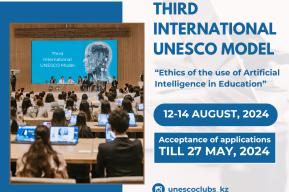Article
UNESCO unites diverse perspectives to inform policies for AI in the creative sectors

“We are not anti-technology. We are pro-people. And technology should serve the needs of people, and not the other way around.” These were the words of Duncan Crabtree-Ireland, SAG-AFTRA National Executive Director and Chief Negotiator, on the occasion of the UNESCO high-level discussion on the impact of artificial intelligence (AI) in the audio-visual industry, which took place on 19 October.
The event, Film Sector on the Frontlines, brought together film stakeholders and AI experts from across the globe to voice a diversity of perspectives on the challenges and opportunities presented by AI in the cultural and creative sectors. More than 1,000 people registered to attend online and in person.
Echoing recent strikes by US writers and actors and a growing movement of global creative voices, panellists expressed both excitement and concern over the rapid development of AI. They called for informed consent, transparency, fair remuneration, inclusion and diversity, as well as better regulation of AI in the creative sectors.
In his keynote speech, Duncan Crabtree-Ireland emphasized that we must prioritise addressing the ramifications of AI by thinking about its human impact. He argued people must be protected from the handful of major corporations who want to maximize their profits at the expense of workers.
Other panellists, including acclaimed filmmaker Michel Gondry and Sarah Dearing, Secretariat of the International Affiliation of Writers Guilds identified the challenge of the potential devaluation of human labour, human creativity, and the ability of creatives to make a living from their work.
Our membership will be working through collective bargaining, the development of contracts, lobbying… every tool at our disposal… to make sure that any AI that evolves will be used as a tool for the writers and not as a replacement of their contribution. This is the key.
Another key issue discussed by panellists was diversity and representation. Director, producer and screenwriter, Joseph Mc Ginty Nichol (“McG”) underlined the increasing ability of young creators to produce visual effects possible to compete with studio quality. Cristóbal Valenzuela, co-founder and CEO of Runway, added that AI tools can indeed help democratize access to filmmaking, cut costs and enhance artistic activity, but these achievements were clouded by equal concerns. Angeles Gonzalez-Sinde, award-winning screenwriter and film director, noted algorithms may risk the public only having the possibility to discover mainstream stories. Yvonne Muinde further questioned the authenticity and global access of AI. While AI may improve access for some, other groups are currently excluded.
If you type anything that has to do with something ‘other’, or from a different space, for example, ‘African artist sitting next to computer’ and you get an African artist in poverty, sitting next to destruction. These biases and these stereotypes are being compounded by AI.”
Watch our short series of interviews with the expert panel.
Dr Mathilde Pavis, an International legal expert in intellectual property, concluded that it is critical to harness the new and growing opportunities AI offers for creativity. She called upon the establishment of internationally harmonized regulations to govern its use in the cultural and creative industries.
Recommendations from the discussion highlighted the need for UNESCO and other international organizations to develop inclusive and participatory international guidelines and standards that are human-centered and guarantee:
Consent: artists and cultural professionals should be informed of and consent to the use of their work for training generative AI models;
Fair remuneration: artists and cultural professionals whose work is being used by generative AI tools should be remunerated and have their intellectual property rights protected;
Transparency: users of generative AI tools should be aware of the sources used to create the content they are requesting, notably to avoid unintentional plagiarism. Similarly, works that were generated through AI should be clearly indicated;
Cultural diversity: generative AI models should be trained and corrected to avoid perpetuating biases and stereotypes and ensure that diverse and representative stories or images are produced and disseminated.
For UNESCO, these discussions are extremely useful as they allow us to have diversity as a starting point, and to ensure we can better accompany countries when it comes to the issue of protecting artists, and therefore protecting cultural diversity.
In 2021, UNESCO produced the first-ever global standard on AI ethics, the Recommendation on the Ethics of Artificial Intelligence, where culture is featured as a specific area of policy action.
The historic MONDIACULT 2022 Declaration further built on UNESCO's continued efforts to support a fair and equitable digital transition for the creative sector, which included the development of Principles for the regulation of digital platforms and the establishment of an expert reflection group on the diversity of cultural expressions in the digital environment, which will convene in 2024 and 2025.












